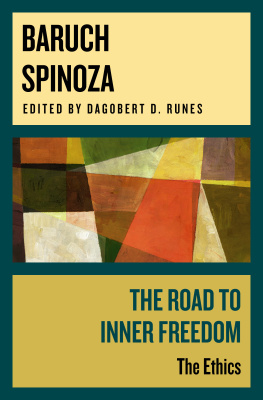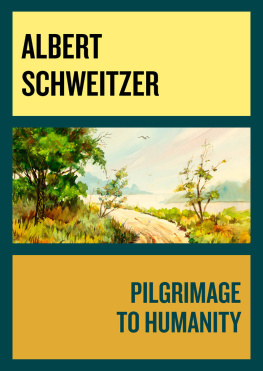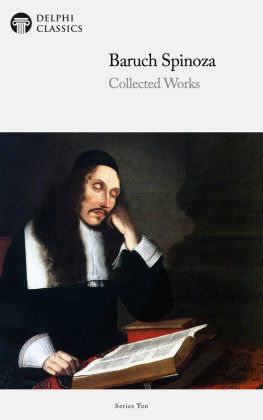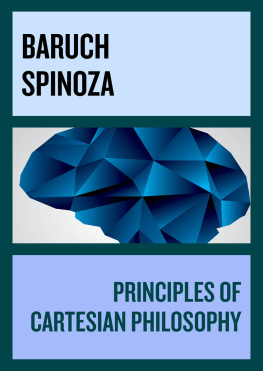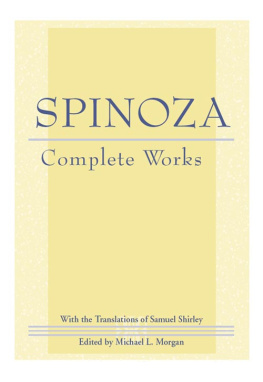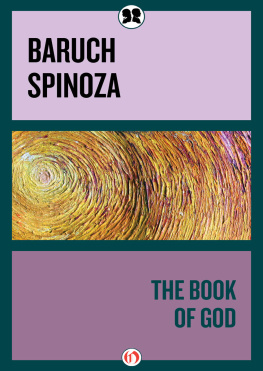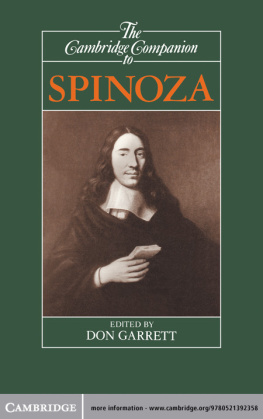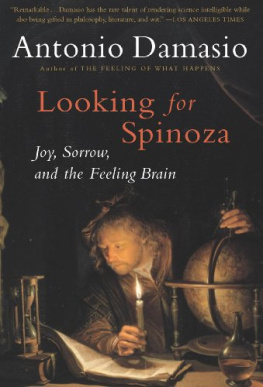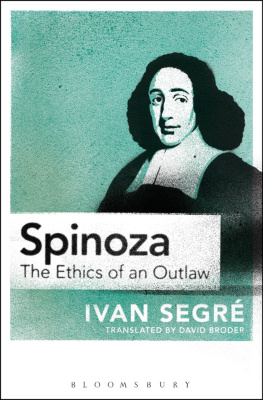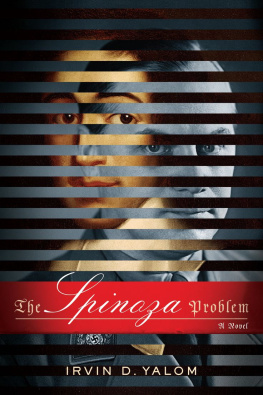Baruch Spinoza - The Road to Inner Freedom: The Ethics
Here you can read online Baruch Spinoza - The Road to Inner Freedom: The Ethics full text of the book (entire story) in english for free. Download pdf and epub, get meaning, cover and reviews about this ebook. year: 2014, publisher: Philosophical Library/Open Road, genre: Science. Description of the work, (preface) as well as reviews are available. Best literature library LitArk.com created for fans of good reading and offers a wide selection of genres:
Romance novel
Science fiction
Adventure
Detective
Science
History
Home and family
Prose
Art
Politics
Computer
Non-fiction
Religion
Business
Children
Humor
Choose a favorite category and find really read worthwhile books. Enjoy immersion in the world of imagination, feel the emotions of the characters or learn something new for yourself, make an fascinating discovery.
- Book:The Road to Inner Freedom: The Ethics
- Author:
- Publisher:Philosophical Library/Open Road
- Genre:
- Year:2014
- Rating:4 / 5
- Favourites:Add to favourites
- Your mark:
- 80
- 1
- 2
- 3
- 4
- 5
The Road to Inner Freedom: The Ethics: summary, description and annotation
We offer to read an annotation, description, summary or preface (depends on what the author of the book "The Road to Inner Freedom: The Ethics" wrote himself). If you haven't found the necessary information about the book — write in the comments, we will try to find it.
The Road to Inner Freedom: The Ethics — read online for free the complete book (whole text) full work
Below is the text of the book, divided by pages. System saving the place of the last page read, allows you to conveniently read the book "The Road to Inner Freedom: The Ethics" online for free, without having to search again every time where you left off. Put a bookmark, and you can go to the page where you finished reading at any time.
Font size:
Interval:
Bookmark:
The Road to Inner Freedom
The Ethics
Baruch Spinoza
Edited and with an introduction by Dagobert D. Runes

Contents
A Word to the Reader
A Word to the Reader
In 1492, the year of the discovery of America, the shadow of religious persecution fell across the Iberian peninsula. The Jews of Spain were set upon by church and state, and under the threat of dire consequences, were expelled to the four corners of the world.
Among those who fled for their lives, first to Portugal and then to the haven of Holland, were the ancestors of Baruch Spinoza. Spinozas father, Michael, settled in Amsterdam, and it is there our philosopher spent his youth. The elder Spinoza was a thrice married man, and from all indications, his household lived in constant turmoil.
Spinoza experienced the savagery of religious strife as well as the torment of emotional insecurity. Thus we can readily understand his never-ceasing efforts to free himself and his fellowman from both.
The life and work of this ailing Portuguese Jew of post-Renaissance Holland were dedicated to the search for a way to human happiness and social dignity.
How to bring about peace of faith and peace of mind were both the early and the mature goals of Spinoza.
He was sickened by the complicated theological disputations that could result in danger to life and limb because of refusal to accept a comma or a word. Scholastic as well as talmudic argumentation, like the constantly dangling sword of the InquisitionCatholic as well as Protestantdrove him to cry out against religion as a system of knowledge.
The Bible is Gods word to the people, he exclaimed, and not to the priests and preachers. Faith is a matter of love, not of knowledge, and to worship means to live in justice and charity. To do good is the only true law of the Torah, and those who are zealots of the letter of the law are not Gods defenders, but His enemies.
These concepts are evident even in the young Spinoza, identifying the Hebrew mitzvah, or commandment, with mitzvah in its other meaning of Godbinding.
This stress on the spirit of Judaism, rather than its legalism, was the earliest expression of a new ideology which in later centuries became the basis of the Jewish Reform movement.
I do not know of any modern philosopher of note more intimately tied to the basic concepts of Judaism than is Spinoza. His melancholy observations on the vanities of life and vacillating mankind are deeply stamped by the cogitations of Ecclesiastes.
He profoundly expounded the love of intuitive wisdom which accompanies mans awareness of God as the all pervading eternity, the Echod and Ain Soph, the One and the Infinite, that can and will conquer the little pleasures of irrational selfishness. He defended heroically and insistently the Hebraic principles of justice and the rights of man in a free community subservient to no entity but the law of the Lord. One can say that through every thought and word of the philosopher Spinoza there breathes the Ruach Hakodesh, the Spirit of Holiness of Judaism. Spinoza may rightly be called Judaissimus, the most Jewish of all thinkers.
With Spinoza, Judaism took its first steps away from the system of orthodox observance. And from the day when Spinozas first work appeared, no one could ever write of Jewish problems without taking issue with the Sage of Rijnsburg.
Spinozas passionate attitude toward religion as a thing of life rather than of doctrine, when carried over into his political philosophy, culminated in the proposition that the business of the state is security for its citizens and nothing else. Therefore, freedom of thought and freedom of speech are the fundamental rights of the citizen.
In his books as well as in his letters, Spinoza pleaded for political and religious freedom, for the right of man to speak freely on whatever moved his mind. Seventeenth century Europe was torn by religious strife, and it was only natural for the issue of mans civil rights to become paramount in his thought.
Spinoza was the philosopher with a purpose par excellence.
The fundamentals of philosophy in all its aspects served him only as the base upon which to erect his principles of the ideal free man.
The free man, viewing the world before him as part of the infinite universe, was for Spinoza the scope and purpose of all cogitation.
To live as the master of ones emotions and passions, that was in the final analysis the goal of Spinozas study in Ethics. How to reach that goal, to see the panorama of daily existence sub specie aeternitatis, he endeavored to explain in the book before us.
While these lofty ideals are ever appealing to us, we must, on the other hand, try to understand that Spinozas co-religionists, leaning upon each other for succor and support, were terrified at Spinozas disavowal of the 613 precepts of the Torah, which he maintained were state regulations of Israel and valid only for that state, which no longer existed. The orthodox Jews of Amsterdam were concerned to the utmost lest the young mans reduction of the Torah from a book of law, history and ritual to a mere volume of theistic inspiration would lead other men out of the fold of the Hebrew community.
This anxiety, and no other reason, caused the synagogal authorities to try to stop the proselytizing rebel, and when all other means failed, they finally placed upon him the heavy shroud of excommunication.
Spinoza spoke ahead of his time and ahead of his people. It took more than a hundred years for mankind to fall into step with his thinking, and it took more than three hundred years for the People of the Book to realize that they had to return to their prodigal son.
Ruach Hakodesh pervades the writings of Baruch Spinoza, the Holy Spirit that has breathed through the wisdom literature of Israel from the days of the philosopher king, Solomon, and even earlier.
Spinozas amor Dei intellectualis, the spiritual love of God, is closest to the Hebrew simchah shel mitzvah, the joy of faith, the joy of the law. In the ideology of Spinoza, living by the law of wisdom was identical with obedience to the divine principle.
The teachings of the Cabala had a tremendous influence upon him. The cardinal idea of the Cabala, the Ain Soph (no end-infinite) from which all being emanates, can easily be identified with Spinozas Substantia, the Endless, the All.
Spinozas epistemology is based on the three forms of knowledge:
1) vague understanding; 2) reason, and 3) intuition. It bears close resemblance to the Cabalistic idea of 1) chochmah, wisdom; 2) binah, reason, and 3) da at, perception.
It is obvious that Spinoza would have attempted to hide the Hebrew root of his basic philosophy; his people did not want him, and it was precisely because of differences over interpretation of the teachings of Judaism that he broke with them. He dropped even his name, Baruch, for the Latin Benedictus.
However, looking back over the sobering distance of three hundred years, we must say with all emphasis that the writings of Spinoza are purely and thoroughly Hebraicroot, stem, and fruit.
In the other phases of his writings, those devoted to a better and ethical inner life, Baruch Spinoza also drew his strength from the treasures of the Cabala. The traditional works of Torah, Talmud, and Cabala were a source of enrichment for the young and striving scholar; however, he always managed to brush aside the merely dogmatic in favor of the essential. His heart was set on the core of the script. Forever in search of the Or Adonai, the Light of the Lord, he paralleled, in a way, the religious experiences of all great mystics from Lao Tse to Fox, from Buddha to Baal Shem Tov.
Next pageFont size:
Interval:
Bookmark:
Similar books «The Road to Inner Freedom: The Ethics»
Look at similar books to The Road to Inner Freedom: The Ethics. We have selected literature similar in name and meaning in the hope of providing readers with more options to find new, interesting, not yet read works.
Discussion, reviews of the book The Road to Inner Freedom: The Ethics and just readers' own opinions. Leave your comments, write what you think about the work, its meaning or the main characters. Specify what exactly you liked and what you didn't like, and why you think so.

